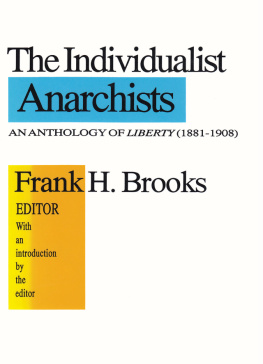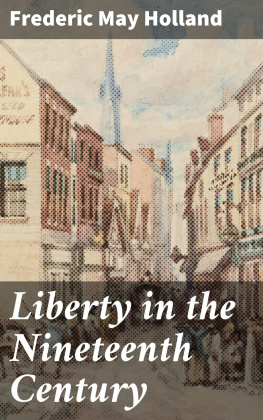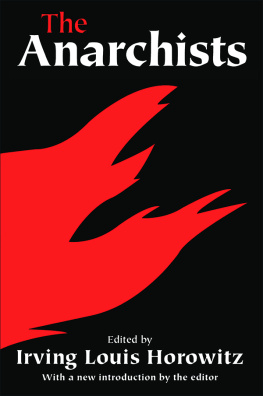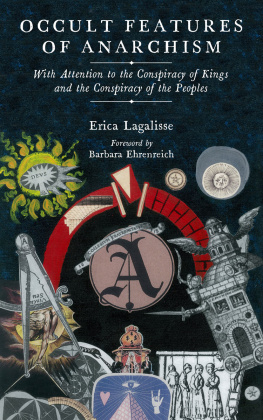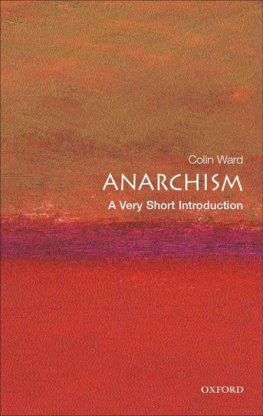The Individualist Anarchists
The Individualist Anarchists
An Anthology of Liberty (1881-1908)
Frank H . Brooks
EDITOR
With an introduction by the editor
First published 1994 by Transaction Publishers
Published 2017 by Routledge
2 Park Square, Milton Park, Abingdon, Oxon OX14 4RN
711 Third Avenue, New York, 10017, USA
Routledge is an imprint of the Taylor & Francis Group, an informa business
Copyright 1994 by Taylor & Francis
All rights reserved. No part of this book may be reprinted or reproduced or utilised in any form or by any electronic, mechanical, or other means, now known or hereafter invented, including photocopying and recording, or in any information storage or retrieval system, without permission in writing from the publishers.
Notice:
Product or corporate names may be trademarks or registered trademarks, and are used only for identification and explanation without intent to infringe.
Library of Congress Catalog Number: 93-30303
Library of Congress Cataloging-in-Publication Data
The individualist anarchists: an anthology of Liberty (1881-1908) / edited and
with an introduction by Frank H. Brooks.
p. cm.
Includes bibliographical references.
ISBN 1-56000-132-1
1. AnarchismUnited StatesHistory. 2. AnarchistsUnited States
History. 3. Liberty (Boston, Mass.) I. Brooks, Frank H., 1961- . II.
Liberty (Boston, Mass.)
HX843.I557 1994
320.5'0973dc20
93-30303
CIP
ISBN 13: 978-1-56000-132-4 (hbk)
Dedicated to Andrea, Jared, and Hanna
It is by now a commonplace that right and left may converge at the extremes. The typical examples of this ideological convergence, however, refer to the similarities of left- and right-wing versions of authoritarianism. Mussolini's trajectory from revolutionary socialist to fascist leader and the awful parallels between Stalinism and Nazism are prominent cases. More recently, New Left activists have become New Right activists. Less commonly cited are those who travel from Right to Left extremism, or those who somehow straddle the divide at the extremes. Often, these extremists are demanding complete liberty, rather than the institution of total authority. Thus, it is anarchism that has the most potential to bridge the gap between right and left libertarians.
That anarchism, notable among ideologies for its almost complete failure to be implemented, is discussed at all is testimony to its intellectual credentials. Yet its singleminded emphasis on liberty conceals a wide variety of anarchist ideologies. Usually considered to be an extreme left-wing ideology, anarchism has always included a significant strain of radical individualism, from the hyperrationalism of Godwin, to the egoism of Stirner, to the libertarians and anarcho-capitalists of today. Bridging the gap between early nineteenth-century individualist anarchism and its resurgence in the late twentieth century is Benjamin Tucker's classic journal of the late nineteenth century, Liberty. Bringing together labor reformers, former state socialists, radicalized free traders, free love advocates, and generally individualists of many stripes, Liberty was a forum for ideological convergence. The focus of this convergence, however, were Tucker's two "plumb-line" principles: individual sovereignty and equal liberty. Around these principles a talented group of individualist radicals gathered, to discuss the foundation of individual liberty and to measure the various reform proposals of the day.
A fascinating journal, Liberty has still to receive the attention it deserves and I feel lucky indeed to be able to present this anthology of writings from its twenty-seven-year run. Editing such an anthology was initially suggested to me by my dissertation advisor, Isaac Kramnick. He directed my research on Dyer Lum, a revolutionary anarchist comrade of the Haymarket defendants who simultaneously promoted individualist economic reforms in Liberty and other radical journals, and thus well knew the significance of Liberty. I'm not sure Dr. Kramnick suspected, however, just how enjoyable and stimulating the project would be for me. His proposal built upon the intellectual (and material) support I have gotten over the years from the Institute for Humane Studies. Institute scholars such as Leonard Liggio, Walter Grinder, Jeremy Shearmur, and Ralph Raico not only did not scoff at my suspicion that anarchism could be a meeting point of right and left, but insisted that I pursue my suspicion in research. The Institute led me to a number of scholars interested in individualist anarchism, particularly Charles Hamilton, Wendy McElroy, Carl Watner, and Michael Coughlin. Although not directly connected with this project, others have helped me to understand the place of anarchism in the broader scheme of American political culture, especially Blaine McKinley, Lyman Tower Sargent, Bruce C. Nelson, Nick Salvatore, and Michael Goldfield. While at McNeese State University, a number of people have helped to sustain and expand my intellectual and academic interests, namely Cheryl Ware, Tom Fox, Alan Schwerin, Martha Hoskins, Mary Richardson, Jamie Whelan, Judith Haydel, and, of course, my students.
This project could not have been completed without the generous support of a National Endowment for the Humanities Summer Stipend in 1991. Given the content of this book, it seems ironic or, as Proudhon might have put it, paradoxical that such support was offered (or solicited, for that matter), but I am nevertheless sincerely grateful for it.
I am also grateful for the forbearance of Andrea, who had to put up with my thinking out loud and occasional excited ramblings, and for the joy and patience of Jared and Hanna, who had to accept my absence on numerous evenings and weekends. Without the help of all these people, this book would not have been possible, but of course they are not responsible for the uses to which I put their contributions. As befits a project centering on individual liberty, I alone accept that responsibility.
The American individualist anarchist newspaper, Liberty, Not the Daughter But the Mother of Order (1881-1908), edited by Benjamin R. Tucker, was "the longest-lived of any radical periodical of economic or political nature in the nation's history and certainly one of the world's most interesting during the past two centuries." It provided "a forum for native American radicalism... which earned the admiration of H.L. Mencken, George Bernard Shaw and Walt Whitman." Libertarians trying to reappropriate the radical thrust of classical liberalism naturally find historical allies in the individualists of late nineteenth-century America. Tucker and the contributors to Liberty confronted the early development of the centralized American state and the complicity of mainstream liberalism in this development by discussing and criticizing laissez-faire economics, political reforms, and such theoretical issues as natural rights. Their critiques of reformers' reliance on the state have become newly relevant as the welfare state is increasingly criticized and Soviet-style communism continues to fragment.
Yet to locate Liberty's significance merely in its prophetic criticisms dramatically curtails and ultimately distorts the nature of the ideology it helped to define. Liberty was not just a treasure trove of protolibertarianism, but the culmination of fifty years of radical individualism and labor reform. The preeminent analyst of American individualist anar Even recognizing its historical roots, however, is insufficient, for Liberty also reflected, and participated in, the dramatic political and intellectual changes occurring around the turn of the century. The same newspaper that popularized the decades-old theories of Josiah Warren, Pierre-Joseph Proudhon, and Max Stirner was also one of the first American journals to print works by and about Bernard Shaw, Friedrich Nietzsche, and Henrik Ibsen. Tucker and his associates wrote perceptively about the Russian nihilists of the 1880s and the French bombthrowers of the 1890s, the development of anarchist communism, reformers such as Henry George and Edward Bellamy, and the temptations of Populist politics. Rooted in a radical past, reacting to (if not notably shaping) a dramatic present, and bearing lessons for the future, Liberty must be considered in several temporal contexts.

